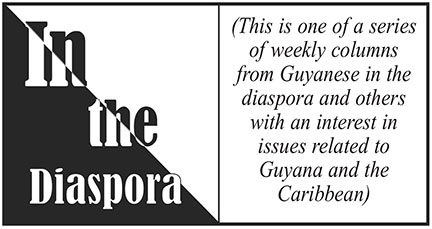Copyright stabroeknews

By Yahtiena Brown and Alfie Smith Let us face it: tensions are rising throughout the Caribbean. Now more than ever, there is a need for diplomacy and the reiteration of non-militaristic principles to guide policy formulation and decision-making. Indeed, key among the exercise of diplomacy of the region, is that today’s leaders prepare the next generation to respect, own and develop their home, our one Caribbean region. The long-standing commitment to the Caribbean as a Zone of Peace serves that purpose, working as a practical foreign policy framework for advancing the peace, stability development and unity of the region. The Caribbean as a Zone of Peace was adopted at the hemispheric level on 31st October 1979 at the General Assembly of the OAS as a resolution. This historic commitment was introduced by Grenada and after adjustments, was passed unanimously, including with support of all Caribbean counteies and the United States. That was and remains a major diplomatic victory and our youth must embrace. It is now deeply ironic that, in a departure from the sentiment and letter of the resolution, the US is asking the same author of the resolution, Grenada, to store military hardware and keep personnel. To do so in the face of no military threat to the region, is to effectively move away from the principal tenets of the resolution: cooperation and integration for just and peaceful development and democratic attainments. As young leaders in the region today follow responses in Grenada and across the Caribbean to the US request, the history of this 46-year old diplomatic success to keep the peace must become known to them and colour their appreciation of strong sentiments calling for the maintenance of this region as a Zone of Peace. There are other iterations of the call for the region as a zone of peace. But immense value of the 1979 Grenada effort and success, resides around the fact that, following its use of force to come to office only months earlier, Grenada wanted to avoid military intervention to itself or other, and instead pursue development and integration. Grenada invaded no one then or since nor has never threatened its neighbours. However it was invaded in October 1983 by Caribbean and US forces. Caribbean youth must be aware also, that there is the permanent necessity for diplomacy between countries, and for nation-states to foster international cooperation so that the challenges of the 21st century can be met. Where there is trust and respect, diplomacy opens doors for peace, trade, tourism, migration and the exchange of cultural and scientific ideas between countries and peoples. Moving from the Gunboat Diplomacy of Palmerston in the mid1800s, to the formation of the1945 founding of the United Nations, the Nixon-Kissenger visit to China in 1971 and US cultural and educational diplomacy of the USA Peace Corps, to China’s Confucius Institutes and its presence within the United Nations system, diplomacy has generally yielded success. All peaceful initiatives are preferred to confrontation and war. With globalisation and the arrival of the technological age, new forms of warfare and espionage are being invented and used. This makes for a more dangerous and highly unpredictable global community and confirms the need for advancing more, not less diplomacy in our world. Advancing the cause of peace and justice through diplomacy is a lesson we must teach our youth. The imperative for diplomacy for small states is generally greater than for major world powers. Small Island Developing States (SIDS), even when they do not keep the peace at home, rely on peaceful cooperation to advance their cause on the regional or world stage Most SIDS choose to possess little to no military capability. Rather, they depend on bilateral partnerships, regional arrangements and the power of multilateral institutions such as The Commonwealth and the United Nations to project their sovereignty, convictions and proposals. Young people must know, that in so doing, SIDS have made development gains for the home front, have provided leadership to the world and have achieved global shifts via diplomacy. Here are three examples among scores. First, it was Caribbean collective diplomacy in the form of recognition of the Cuban government in 1972 by Barbados, Guyana, Jamaica and Trinidad & Tobago that disrupted Cuban isolation from the region. Second, it is CARICOM with its many allies that championed the ‘1.5°C to stay alive’ target in climate change negotiations of the 2010s, raising international ambition, justice and a chance of survival. This principled position bore fruit with its adoption in the 2015 Paris Agreement. Third, Caribbean diplomacy in support of Guyana and for peaceful negotiations, has effectively stayed military action on Venezuela’s claims on Guyana’s Essequibo region. The Caribbean Community remains fully engaged. Fourth, since 2022, the “Bridgetown Initiative”, led by Barbados, has been a powerful call for reform of the architecture of the International Financial Institutions for fiscal space and financial support for SIDS and most of the developing world; it is significantly influencing the global lending chessboard. In these and more, including the 1979 Zone of Peace resolution of 1979 which still serves the region well, our youth can recognise that Caribbean diplomacy has amassed over half a century of positive diplomacy legacy that they are inheriting – one of the pursuit of peace, justice and development. Unlike many nations and some regions, the Caribbean is not passing on to its future leaders, a legacy of pursuing war. And let us not forget that if it was not undermined, Caribbean diplomacy would have found a peaceful resolution with Grenadians to the October 1983 conflict and killings in Grenada, in place of invasion that killed many from several Caribbean countries. It is not out of naivety that Caribbean leaders use diplomatic platforms and options. For them, diplomacy over coercion, militarism and war is a winning strategy to bring all parties into dialogue on every conceivable subject. It is respectful diplomatic engagements, not coercion, preparation for war or war itself, that has always offered the strongest possibility to save and dignify human life, which for this region, is the ultimate ambition of statecraft. In this foreign policy decision-making moment, Grenada and all the Caribbean should continue to embrace the imperatives of diplomacy and especially the idea of the Caribbean as a Zone of Peace. That historic 1979 Grenada-led Zone of Peace resolution is an anchor for the region to continue to shun war, to grow democracy and to bequeath a future worth having by young persons, including youth leadership who are already among us, listening and observing.



